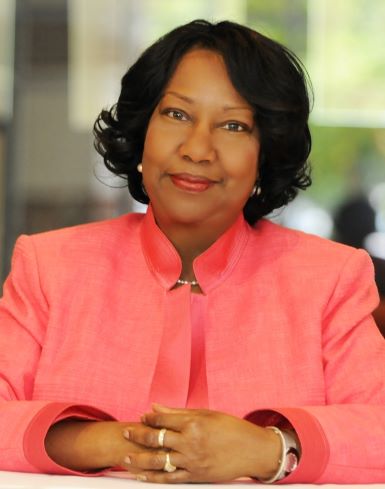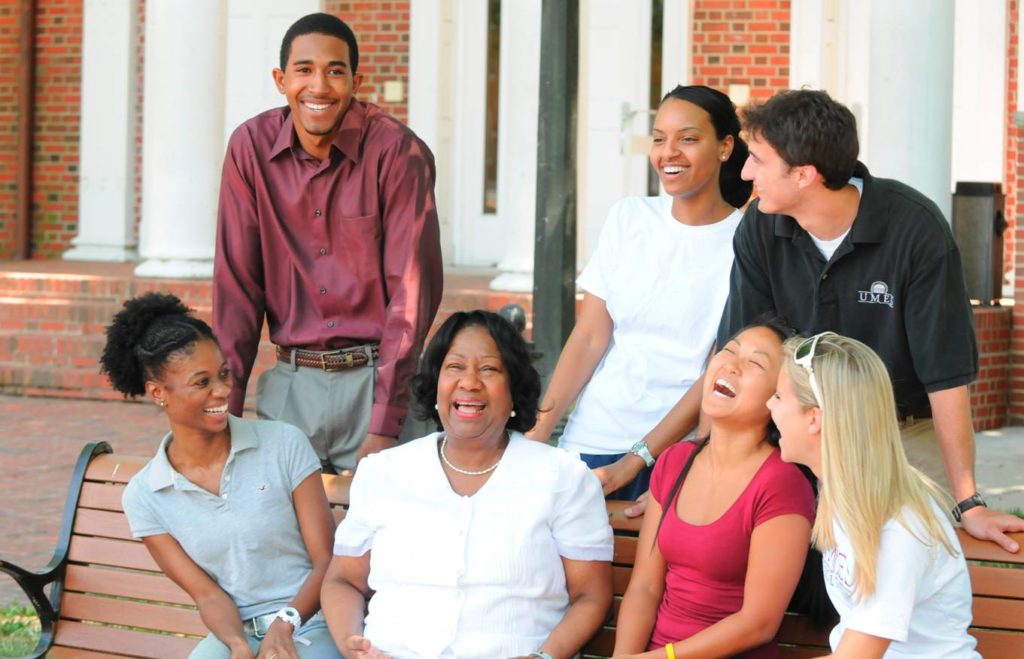
When she arrived in Princess Anne, she talked of “making good better.” By every benchmark, she made “better … best.”
Thelma Barnaby Thompson became UMES’ 13th chief executive in July 2002. Thompson earned a diploma in teacher education from Bethlehem Teachers’ College in her native Jamaica. (She playfully called herself “Jamerican”). Her family moved in the 1960s to the Washington area, where she earned a Bachelor of Arts (cum laude) in 1970, Master of Arts in English in 1972, and a Ph.D. in English literature in 1978, all at Howard University.
Upon being named president, Thompson said, “With the students at the center of the enterprise, I want to work with all constituencies to make UMES a respected center of learning.”
“We are entrusted with the minds of young students, and to me that makes education much more than a business. It dictates the future of our nation and our graduates tell us who we are as a society,” she said.
When Thompson took over as president after four years as vice president for academic affairs at Norfolk (Va.) State University, UMES enrolled 3,644 students. By the end of her nine-year tenure, enrollment was a record 4,540, with historic highs for undergraduates and graduate students.
This continuous growth occurred at a time when Historically Black Colleges and Universities (HBCUs) faced stagnant enrollments. UMES’ popularity with students attracted the attention of peers, who consistently listed the university in the upper tier of HBCUs in an annual higher education survey by U.S. News & World Reports.
Thompson’s credentials as an authority on the university accreditation process preceded her, and she made pursuit of those important academic program credentials one of her priorities. From four accredited programs in 2002, there were 26 by 2011 — including the Department of Business, Management and Accounting in the spring 2011. The surge demonstrated measureable qualitative growth.
New academic programs also were added, among them a four-year engineering degree, the only PGA-accredited professional golf management program at an HBCU and a three-year doctorate in pharmacy. Demand for admission to the pharmacy program was extraordinary: 931 applications competed for 60 spots in the inaugural class seated in 2010.
Enhancing the institution’s international presence was another of Thompson’s signature priorities. UMES had 11 international cooperation agreements prior to 2002; since then it signed 14 more, fulfilling Thompson’s vision of expanding the campus’s global reach.
UMES launched a seven-year $14-million “Campaign for Academic Excellence” in 2004. By the campaign’s end in July 2011, the university had amassed nearly $15 million in charitable donations plus an additional $2 million in matching funds from the federal Title III program. Multi-million dollar gifts from the late Richard F. Hazel and the Richard Henson Foundation are among the largest ever to a Maryland HBCU. Endowed scholarships were a campaign priority, and the institution raised some $8 million in endowed funds.
Thompson put an emphasis on pursuit of federal and state grants as well as sponsored research as funding sources for campus programs. The result: nearly $200 million from government agencies were secured during her tenure.
Her emphasis on entrepreneurial thinking is evident when tallying the commercialization and community outreach ventures brought to fruition during her tenure: a landmark agreement with U.S. Orchid Laboratory & Nursery; creation of the Maryland Hawk Corp.; the launch of the HawkSat 1 satellite; the revolutionary “Poultry House of the Future” research; and a 17-acre, privately built solar-panel grid activated in March 2011.
Four buildings opened during Thompson’s nine years as president: the Center for Food Science and Technology, a physical plant headquarters, a research center on the Atlantic coast near Assateague Island (named for U.S. Sen. Paul S. Sarbanes) and Hazel Hall, named in honor of Salisbury businessman and philanthropist Richard F. Hazel.
On the horizon at UMES’ 125th anniversary: the state of Maryland has OK’d planning funds for a $103 million engineering-aviation science building – with anticipated completion in 2015.

Thompson’s emphasis on excellence also extended to the arts and athletics. UMES’ Jazz Band and the Concert Choir traveled from the nation’s capital to the Caribbean, from Africa to Europe. Nobel Prize winners, including the Rev. Desmond Tutu, visited the campus and interacted with students. Internationally acclaimed musicians, including Wynton Marsalis, performed.
Coaches in men’s and women’s basketball are leading a hoops resurgence. The track and cross country teams challenge annually for preeminence in the Mid-Eastern Athletic Conference. And the women’s bowling team captured two NCAA Division I national championships, the first NCAA title for UMES and the first HBCU to claim an NCAA Division 1 national crown in a women’s sport.
Thompson also knew how to throw a party. An annual gala she endorsed raised thousands of dollars in endowed scholarship funds. The two most recent featured entertainers who brought international exposure to the campus: Tyne Daly, Patty Duke, Lou Gossett Jr., David Alan Grier, Pam Grier, B.B. King, Sharon Stone and Dionne Warwick attracted sold-out audiences.
President Thompson, who retired Aug. 15, 2011, indeed made better best.

